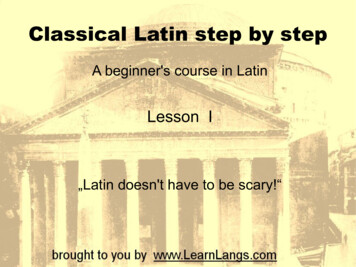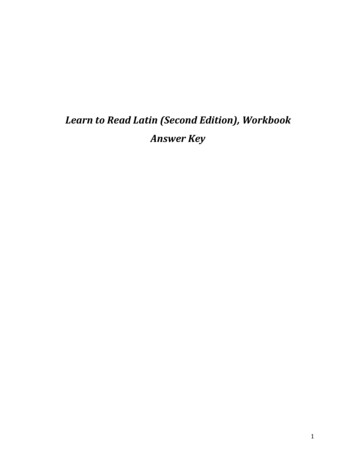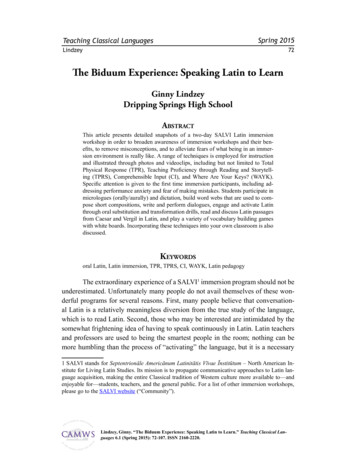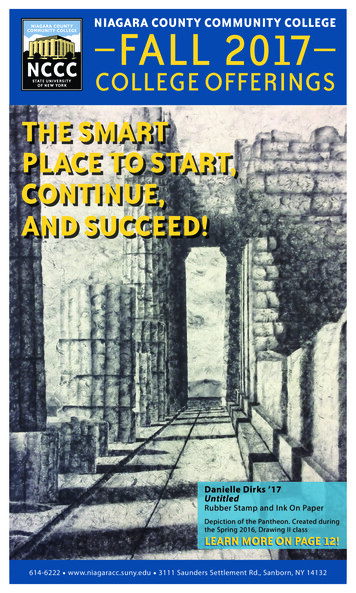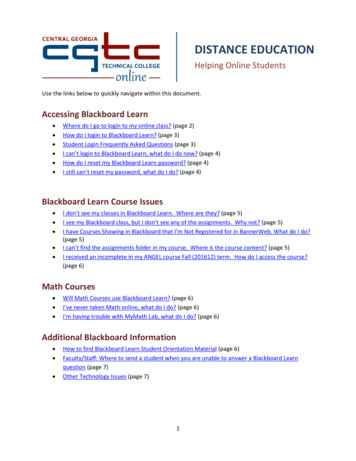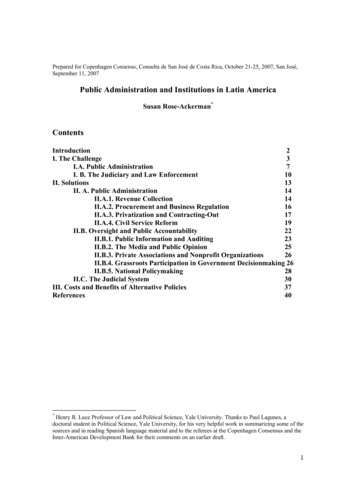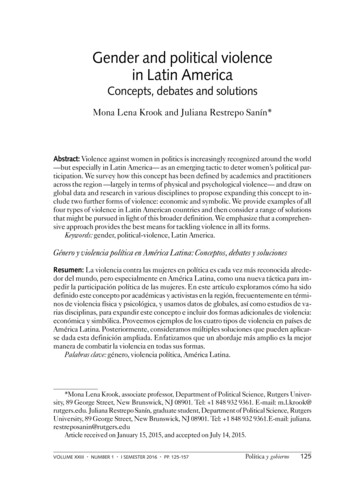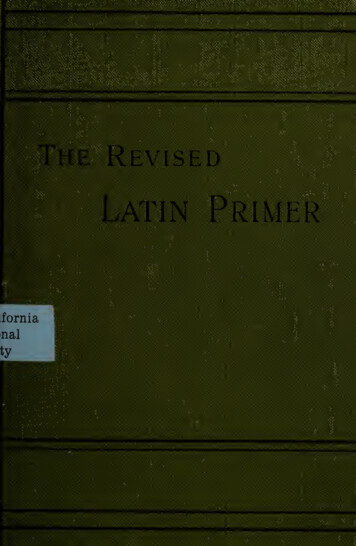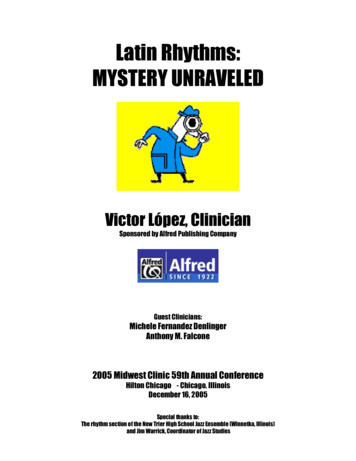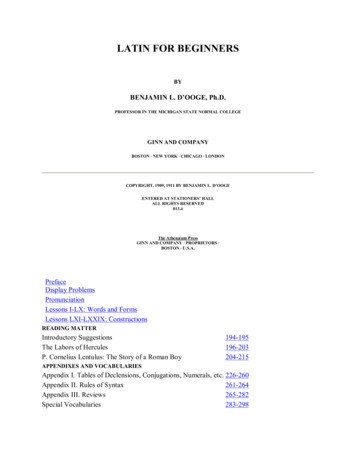
Transcription
VIAHow to Learn Latin . And Almo t Anything ElseDwane Thomas
VIAHow to Learn Latin . And Almo t Anything ElseDwane Thomas
Copyright 2015 by Dwane ThomasAll rights reserved. No part of this book may be reproduced in any form whatsoever, stored in aretrieval system, now known or to be invented, or transmitted in any form or by any means,electronic, mechanical, photocopying, recording, scanning, or otherwise, without the prior writtenpermission of the author or publisher.Manufactured in the United States of America.2
TO MY FAMILY3
TABLE OF CONTENTSINTRODUCTION .6Chapter 1: SET A GOAL. .9Chapter 2: FIND THE TIME. .13Chapter 3: DO NOT QUIT. .29Chapter 4: BECOME A MOVING TARGET. .36Chapter 5: THE TOOLS YOU WILL NEED .41Chapter 6: LISTEN UP! .50Chapter 7: READ! .57Chapter 8: WRITE! .64Chapter 9: SPEAK UP! .69Chapter 10: GET SOME HELP. .90Chapter 11: SHOW OTHERS THE WAY. .94CONCLUSION .1014
5
IntroductionFrom the summit of an animated cliff, a sad, starved coyote watches as hisdinner runs away. The sun sets. Wile E. Coyote sighs. Another day without dinner.As a child, I loved Wile E. Coyote versus the Road Runner.The story is predictable. In show after show, Wile E. Coyote desperately chaseshis dream dinner; Road Runner. Coyote never catches him.The cartoon was entertaining, nothing more.So I thought.Not long ago, it hit me.You could learn a lot from Wile E. Coyote.Latin is a famously tough subject. Wile E. Coyote can teach you how to learnLatin. You are probably wondering. what can a cartoon character teach me aboutLatin?As it turns out, he can teach you a lot.(Eatibus almost anythingus)6
First, Wile E. Coyote shows you how to set clear goals. He knows exactly whathe wants.He has one, and only one, crystal clear goal: Eat Road Runner!All obstacles, all distractions, all hurdles, all interruptions fade away. Nothingelse matters. Not even his own safety matters. Gotta get that bird! Like Wile E.Coyote, you will need clear goals if you are going to learn Latin.Second, Wile E. Coyote teaches determination. Nothing can stop him. He willcapture Road Runner, or die trying. Coyote never gives up. Ever. Like Wile E. Coyote,you will need determination.Third, Wile E. Coyote will teach you to take action. He moves. He does not waituntil conditions are perfect. He wakes up each morning, jumps out of bed, and boltsafter the goal. Like Wile E. Coyote, you must take action.Fourth, Wile E. Coyote teaches you to invest in yourself. He is willing to orderanything to get the job done. If there is a course titled, “How to capture a Road Runnerin Seven easy steps”, you can bet it is on Coyote’s shelf. To learn Latin, you, like WileE. Coyote, must invest in yourself.Fifth, Wile E. Coyote reminds you to stay humble. He is willing to fail. He is notafraid to admit that he is not the sharpest elevator in the ocean. He is not afraid to askfor assistance. After he has given his best, Coyote holds up a sign, requesting help.To learn Latin, you must be willing to ask for help.Sixth, Wile E. Coyote shows you that the target plays hard to get. The target iselusive. The target is slippery. Wile E. Coyote never does catch dinner. Road runneralways manages to stay just out of reach. Unlike Wile E. Coyote, you can hit the target.You can learn Latin. Just remember this: Latin, like Road Runner, will play hard to get.7
So how does this help you?In this book, you are going to find out exactly what you should do to learn Latin.This is not a book about what you should do. You know what you should do.If you are reading this, chances are high that you know the benefits of learningLatin.As I said, You know what you should do. You are here because you need toknow exactly what to do.You may be asking, “What steps do I take? Which books should I read? Whichpronunciation will I use? Where do I find the help I need?”I have been teaching Latin for almost 20 years. I have taught students fromelementary school to high school. I have taught college students and adults.In this book, I will share all of my secrets with you. I will show you all theshortcuts I have discovered. I will give you every detail I can possibly think of. I willhelp you learn this ancient and beautiful language.We will start with the basics. Ignore the basics at your own peril. These stepswill guarantee your success. Once the basics are out of the way, we will get specific.Very specific.Remember, I have done the research for you. All you have to do is join me.So. Are you with me?Good. Then, Let’s go!8
Chapter I“You are never too old to set another goal or to dream a new dream.”- C. S. LewisWile E. Coyote set clear goals. He knows exactly what he wants. He has one,crystal clear goal.Eat Road Runner!All obstacles, all distractions, all hurdles, all interruptions fade from view.To learn Latin, imitate Wile E. Coyote. Set goals. Go after those goals with “door die” determination.Unfortunately for Wile E. Coyote, he never reaches his goal. The show must goon, of course. Were he to eat Road Runner, the show would cease to entertain.You, however, can reach your goal!You can reach the goal. Unlike Wile E. Coyote, you do not have a scriptwriterpreventing you from reaching the goal.Several years ago, I discovered an interesting study in The Pledge by MichaelMasterson. According to Masterson, Harvard business school conducted a study on itsgraduates 10 years after graduation. They found that:27% of them were not doing well at all. They needed financial assistance.60% of the graduates were living paycheck to paycheck.10% of the graduates were living comfortably.Only 3% of the students were financially independent.The researchers then looked at goal setting.9
What they discovered stunned them.The 27% who needed financial assistance had absolutely no goal settingprocesses in their lives.The 60% who were living paycheck to paycheck had only the most basic goals.They had basic survival goals, like making it to the next paycheck.The 10% who were living comfortably had general goals. They had some ideawhere they were going and they had some idea how they wanted to get there.The 3% who were financially independent, however, had written their goalsdown. They had also written down the specific steps necessary to reach their goals.What, then, is the lesson for us? Simple.Aim at nothing and you will hit it every time.You are reading this because you decided to learn Latin. Write the goal down.Really, write it down. Clear, written goals force you to focus. Clear, written goals keepyou on track.Do this now! Set a goal.Be sure that your goal is specific.I want to learn Latin, is a goal. It is not, however, specific enough.Deciding that you will be able to read Latin within one to two years is specific.You might write something like:Two years from today, by my 19th birthday, I will be able to read the NewTestament in Latin. That is a specific, measurable goal.But wait. Why should you try to learn Latin in one to two years?Simple. In all my years of teaching, I have watched Latin students plod throughLatin. Sometimes it takes seven or eight years. This is too long. They grow weary.They get bored. They quit. It will happen to you, too.The finish line is so far off in the distant future, you feel you will never make it.Take too long, and you will despair. You will be tempted to quit.10
It should take you no more than two years to learn Latin grammar. After that, youwill simply learn new words.Take the next two years, dedicate an hour, or two a day to the study of Latin. Intwo years, you will have learned the complicated Latin grammar.You should be able to read the Bible in Latin, the Vulgate, in two years.Okay. Now that you have a specific, measurable goal, you have to ask yourself.What exactly will this look like every day?Do you know how to eat an elephant? Relax. It’s just a figure of speech. I don’teat elephants. If you were to eat one, however, there is only one way I would do it.one bite at a time.Your goal is an elephant.You must break your large goal into smaller goals.To learn Latin in two years, you must dedicate an hour or two, each day, to study.Have you ever heard of the 80/20 rule? The rule states that 20% of your effortgenerates 80% of your results. In other words, we dedicate most of our time to lowvalue tasks. These tasks keep us from our important work. What are these tasks?They vary for everyone. I do not know what your low value tasks are, but I can sharemine.Low value tasks, for me, include: EmailDrivingPhone CallsWatching TelevisionFunny animal videos on YouTubeSurfing the InternetStanding in lineSitting in trafficFacebookTwitterIt is easy for me to start the day with one, or any number of these low valuetasks. If I am not careful, these tasks fill most (80%) of my day. Some of them areinescapable. No matter how hard I try, I can not seem to escape email. If possible,though, I push my low value tasks off to the end of the day.11
Instead of checking email first thing every morning, I try spend the first 20% ofthe day focused on the most important task. Why? I believe we should focus on theone thing that will make the greatest impact in our lives.Change your routine. Develop this one habit. It will change your life.If we divide an 8 hour school or workday by the 80/20 rule, we end up with thefollowing:8 hours x 60 minutes 480 minutes.480 minutes x 20% (.20) 96 minutes.Using these numbers, we now know what to do. We should spend the first 96minutes of our day working on our most important goal. 96 minutes is a bit more thanan hour and a half.If you are serious about learning another language (in this case, Latin), youshould spend the first hour and a half of each day doing several things. You should Listen to Latin audio recordingsRead in LatinStudy Latin vocabularySpeak in LatinWrite in LatinIn this book, you will learn exactly how to accomplish each of these tasks. I willnot only show you what you should do, I will also show you exactly how to do it. I willshow you how to reach the goal.Latin is a tough language, but you can learn it. It is not out of reach.But, before we get to that, I am willing to bet you are already asking an importantquestion.Great. Where am I going to find this much time every day?Glad you asked 12
Chapter II“You can learn a language in twelve months using only themoments you didn’t realize you had.”- Barry Farber, How to Learn Any LanguageYou have the time.I will help you find it.Let’s start with the obvious.Do you spend a lot of time watching television?Turn it off.According to the United States Department of Labor, Americans spend almost 3hours a day watching television. I have seen higher numbers on other sites. But, hey,let’s give our fellow countrymen the benefit of the doubt. Let’s stick with the lowernumber.The average American watches television for 3 hours a day.Consider this:“Wikipedia took one hundred million hours of volunteer time to create.How do we measure this relative to other uses of time? Well, TV watching, whichis the largest use of time, takes two hundred billion hours every year -- in the USalone. To put this in perspective, we spend a Wikipedia worth of time everyweekend in the US watching advertisements alone. If we were to forgo ourtelevision addiction for just one year, the world would have over a trillion hours ofcognitive surplus to commit to share projects. Imagine what we could do for theworld's grand challenges with a trillion hours of focused attention.”- Peter Diamandis in, Abundance13
If you are watching an average of 3 hours of television daily, you have all the timeyou need to learn a new language. You could close this book right now and use this tipalone to learn Latin, or any other language.But. you like watching television. You have favorite shows you can’t miss!Fine. Record them. Take one day a week. Watch them. Have fun.During the other six days of the week, however, leave the T.V. off. Study Latininstead. Study 3 hours a day.3 hours a day, 6 days a week, equals 18 hours a week. Those 18 hours turn into72 hours a month. 72 hours a month equals 900 hours a year! (By the way, I am givingyou two weeks off a year. You’re welcome. 50 weeks x 18 hours equals 900 hours.)In Michael Masterson’s book, The Pledge, he states that you need roughly 1,000hours in any subject to become proficient. Simply by turning the T.V. off, you couldbecome proficient in Latin. in one year.CutDayWeekMonthYearTelevision3 hours18 hours72 hours900 hoursYou just found 900 hours a year! Use those hours to become proficient in Latin.You could stop here and you would surpass most Americans. But, guess what? Thereis more time available in your day.Do you spend a lot of time surfing the Net?Stop surfing the internet foolishly. Stop watching YouTube videos of cute kittens.Stop watching videos of goats that scream like humans. Stop watching dumb videos.According to one study, the average American now spends 23 hours a weekonline. Let’s assume much of that time is productive, and slash it. T
To learn Latin, you must be willing to ask for help. Sixth, Wile E. Coyote shows you that the target plays hard to get. The target is elusive. The target is slippery. Wile E. Coyote never does catch dinner. Road runner always manages to stay just out of reach. Unlike Wile E. Coyote, you can hit the target. You can learn Latin. Just remember .
